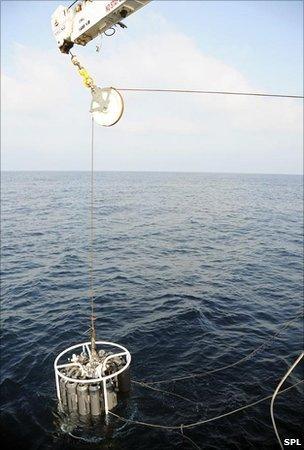Oceans divide over 1970s warming
- Published

Fresh water from ice melt is raised as a possible cause of the changes
The surfaces of the oceans went through a short period of rapid temperature change 40 years ago, scientists have found - but the cause is unknown.
Top layers of Northern Hemisphere water cooled by about 0.3C; the south saw roughly the same degree of warming.
Writing in the journal Nature, the team suggests that air pollution cannot be responsible for the changes, as has been suggested for mid-century cooling.
They do not suggest a cause. It is not clear what could link all the oceans.
However, events called Great Salinity Anomalies have been recorded in the last few decades in the North Atlantic Ocean - including one around 1970.
The 1970s global temperature record shows a period where the Earth's surface cooled in the Northern Hemisphere, while the Southern Hemisphere saw warming.
It has been suggested that this difference could be accounted for by greater production of aerosols - tiny dust and soot particles - in the north, where the vast majority of the world's industry is found.
Aerosols cool the planet's surface by reflecting solar radiation back into space.
But the suddenness of the changes seen in the new research, led by Dave Thompson from Colorado State University in Fort Collins, US, suggests that the explanation could lie elsewhere, as aerosols would be expected to take effect more gradually.
"The results suggest that something other than aerosols was the primary driver in the differences in temperatures between the two hemispheres in the mid-20th Century," Professor Thompson told BBC News.
"We can't rule them out - they could be of absolutely fundamental importance - the point is the abruptness in the observed difference time series is hard to reconcile with what you'd expect aerosol loadings to do."
Unclear waters
The causes of the Great Salinity Anomalies (GSAs) are not clear; and they may not all have the same cause, or progress in the same pattern.
In the 1970s event, fresh water appears to have entered the North Atlantic and lowered the salinity of water in the region.
In large enough quantities, this freshening can slow the Atlantic portion of the global pattern of currents known as the thermohaline circulation - in popular parlance, "turning off the Gulf Stream", as in the movie The Day After Tomorrow.

Data comes from direct observatons made on ships
The temperature shifts found by Professor Thompson's team may have been fairly fast, taking place over just five years, but they were glacial compared to the speed of Hollywood imagination, which had New York ice-bound within a day.
If the 1970s GSA were the root cause of these rapid changes, there has to be another step in the chain that explains how the effects penetrated to other oceans, because the Northern Pacfiic also cooled.
In addition, later GSAs do not appear to have co-incided with global changes in ocean heat distribution.
Nevertheless, some observers, such as Mark Maslin, director of the Environment Institute at University College London, UK, are convinced.
"This early 1970s cooling, instead of being due to increased sulphate aerosols or decadal cycles in ocean circulation, was probably caused by the rapid freshening of the North Atlantic during the GSA," he said.
"This paper is important in that it shows how sensitive the climate of the Northern Hemisphere is to the salinity balance in the North Atlantic Ocean, providing a stark warning of what may happen in the future with larger releases of freshwater into the North Atlantic."
Old records
The records on which this paper rests come from readings taken on board ships as they traversed the oceans.
As such, the raw data has been around and available for years. So in one sense, it is surprising that the findings have not been brought to light before.
"It's certainly not the first time that people have noticed decadal variability in the sea surface temperatures, but I think the abruptness of the changes has been under-appreciated," said Dave Thompson.
"That's because there's often smoothing done on the data; you may draw out the signal of decadal variability that way, but by smoothing you lose information about more rapid, short-term changes."
Michael Schlesinger from the University of Illinois at Urbana-Champaign is one of the scientists who first identified a major ocean temperature cycle on decadal scales - the Atlantic Multidecadal Oscillation - but he remains uncovinced about the value of the new research.
"I can't get excited about this - it seems like something of a tempest in a teacup," he told BBC News.
"You have a slight cooling in one hemisphere and a slight warming in the other, and you subtract one from the other and find something - but are we going to do this for every bump and jump on the datasets?
"I'm not sure it tells us a lot."
Richard.Black-INTERNET@bbc.co.uk
- Published16 September 2010